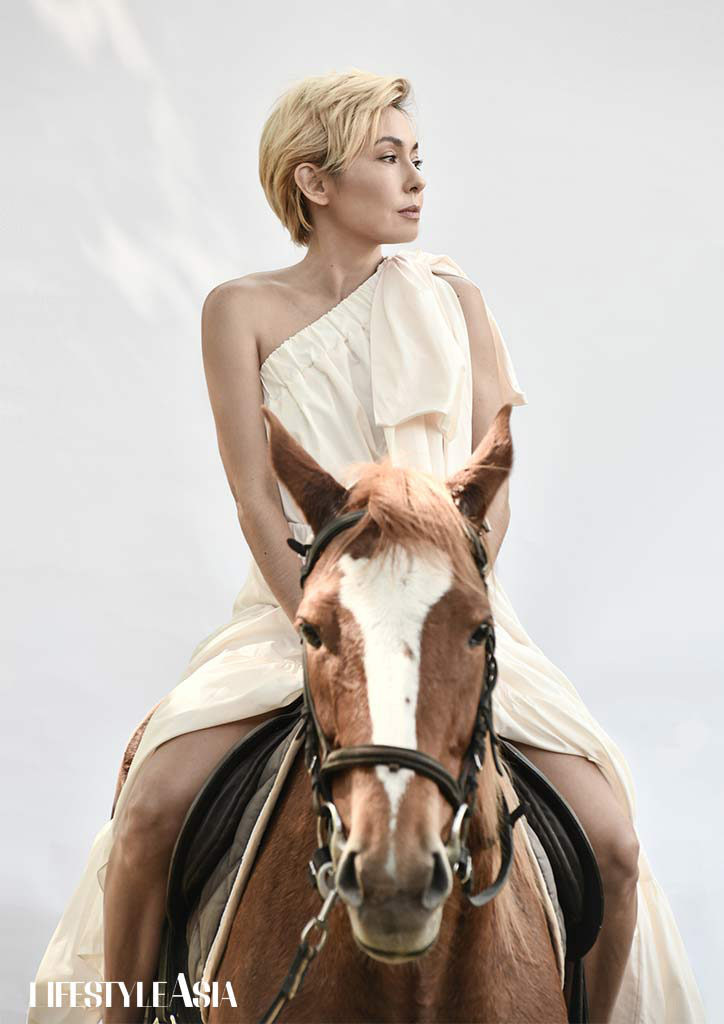
One Shoulder Top with Fixed Bow Detail & 4-Tier Full Skirt by Vania Romoff
During the early days of quarantine measures in the Philippines, we suddenly found ourselves with more time than we knew what to do with. Those of us lucky to work at home did so, while others picked up new and old endeavors like reading, baking and gardening. Hindy Weber was hard at work, working on her skincare line, Hindy Weber Skin.
“Just like my food and fashion, I’m also very selective about what I put on my skin. I couldn’t find what I was looking for or it was too expensive,” says Hindy. Mindful of green washing (a practice where brands overvalue the organic materials in their lines for good publicity), Hindy took the reins. “I decided to produce it with a trusted formulator. I put my heart into everything I do,” she says. The result is a line of products where nothing us compromised. “Business is not my bottom line. Fame is not either. I want my customers to feel utterly at ease with their beauty and style, with the highest consciousness.”
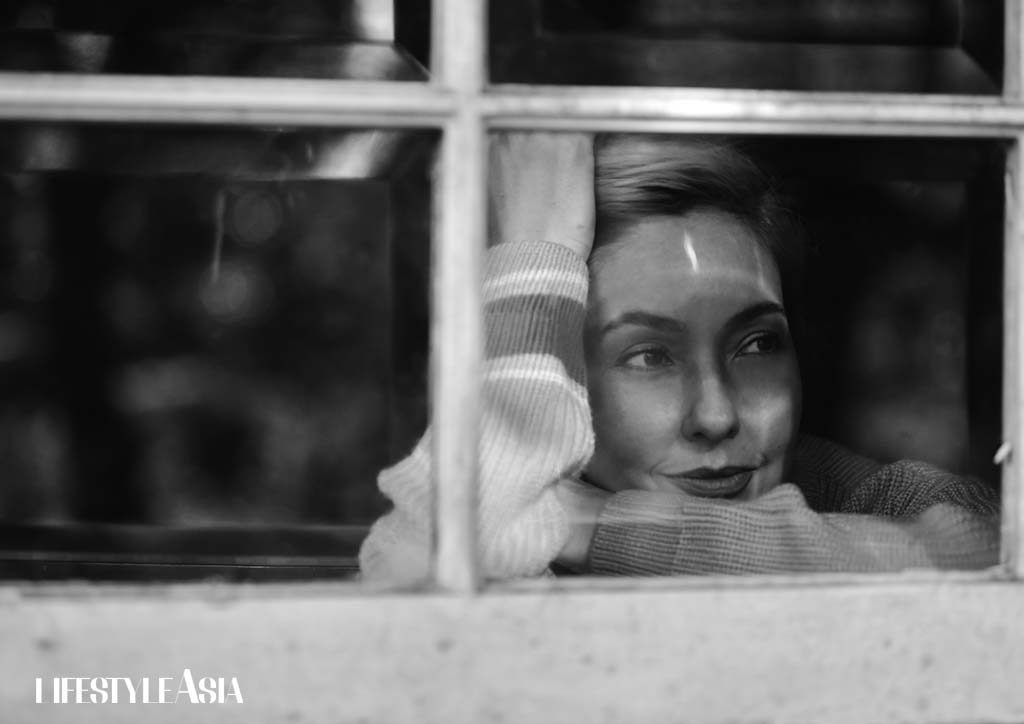
Hindy Weber Skin is sold alongside the clothes in her brand, Hindy Weber Every.Day. Hindy got back into fashion after a few years just focusing on the Holy Carabao Farm. Among other things, it was a decision taken to focus on her family. “I also felt overwhelmed by the machinations of the industry. It felt lifeless and just too business-oriented. By [2010], we were already starting our farm. So I went neck deep into my other passion: food,” she shares. But like all creative passions, her love for retail never truly went away. Continuing to dabble in fashion, she kept a small atelier, accepting up to 12 clients a year and chose to focus on bridal-wear or eveningwear. “I thought I would never go back into ready-to-wear because I was already so disconnected with the industry,” she says. The years of working on Holy Carabao Farm, and falling more in tune with the rhythms of farm life led Hindy to believe that her focus was forever going to be on her environmental pursuits. After all, the fashion industry is one of the biggest contributors to pollution.
However, two years ago Hindy came across sources for organic materials, like water-safe dyes, and practices like slow manufacturing. “This was the only sign I needed to embark on my ready-to-wear career part deux. I call it Hindy Weber Every.Day because my clothes are meant to be timeless, luxurious but casual enough to wear every day. It’s also a reminder to infuse self-care, simple joys and style in your everyday,” she says. Each step in the process, from design, production and packaging is clean. “Hindy Weber Every.Day uses only natural, organic, non-toxic ingredients and materials. All the trimmings and packaging are made of reusable or biodegradable materials. All our dyes are water-safe. All manufacturing processes are small and family-supportive,” she says.
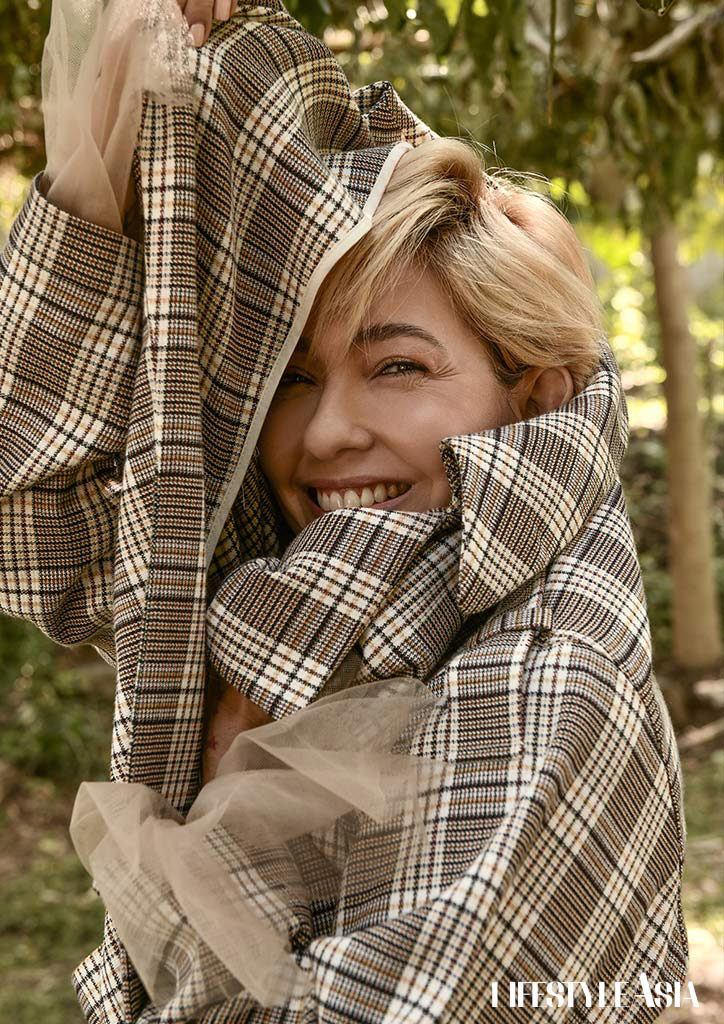
A decade ago, when the Philippines was newly in the grips of fast-fashion after the introduction and rise of mega brands like Zara and H&M, it would have been hard to make inroads with a focus on ethical, sustainable fashion. But nowadays, after noting the effects wracked on the environment, and incidents like the Rana Plaza Disaster, when a factory building that housed the fabrication of clothes for international fast fashion brands collapsed and killed 1,134 people (and injured 2,500), people are more willing to give saving the environment over quick trends a try. “Our customers are already conscious and because of their choices, they inspire others to make better choices also,” says Hindy. “This 2020 lockdown also helped emphasize the dire need to care for our planet. So we are at a point where what we do should already become the norm, not the exception. All businesses should take the health of people and planet into account.”
Hindy is happy to note that there are more ethically-minded and slow fashion brands today, which coincides with an appreciation for Filipino traditional techniques in textiles, dyeing and adornment. She also knows that people have become more discerning when it comes to just how environmentally friendly a fashion-based business venture can be. “I have been espousing this lifestyle for 20 years. I am transparent about all my processes. My face is up front and center in all my work. I don’t hide behind a brand name. I don’t hide behind facades. Of course this puts me in a vulnerable business position, but I can’t think of doing business any other way,” she says.
HEALTH IS WEALTH
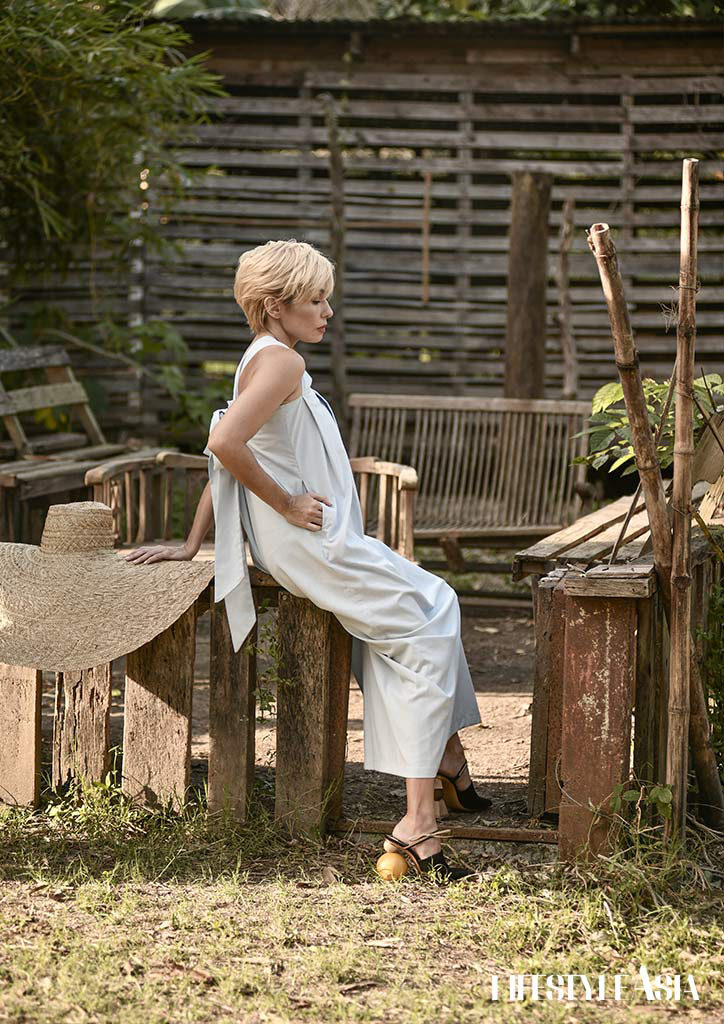
Mirang Long Dress with front pleats, side pockets and adjustable strap in cotton linen by BARÒ LABEL, Les Mules Andao Mule by Jacquemus
As a mother, Hindy is less talk, more action. “My kids hardly listen to advice, per se. They listen more to actions, so I try to be the kind of role model that I think they would grow up to respect and be influenced by. They know I have very strong convictions when it comes to wellness, food, relationships and style,” she says. For food, while she lets her family enjoy pizza or fast food on occasion, she also places responsibility on returning to what feels right. “I trust they will always go back to that. I cannot force them to have this or that diet. I only impose my authority when they are ill. Then Mommy mode kicks in. Eating “healthy”, growing food, farming, celebrating through food…these are all normal to them.”
For Hindy, health and wellness is an entire approach to life, one that does not just cover fitness or food, but encompasses all life choices. “I subscribe to the logic that everything is interconnected and therefore all our decisions contribute to our health and wellness. This can be anything from the music we listen to, the books we read, the food we eat of course, and the medicines we take, and so on,” she says.
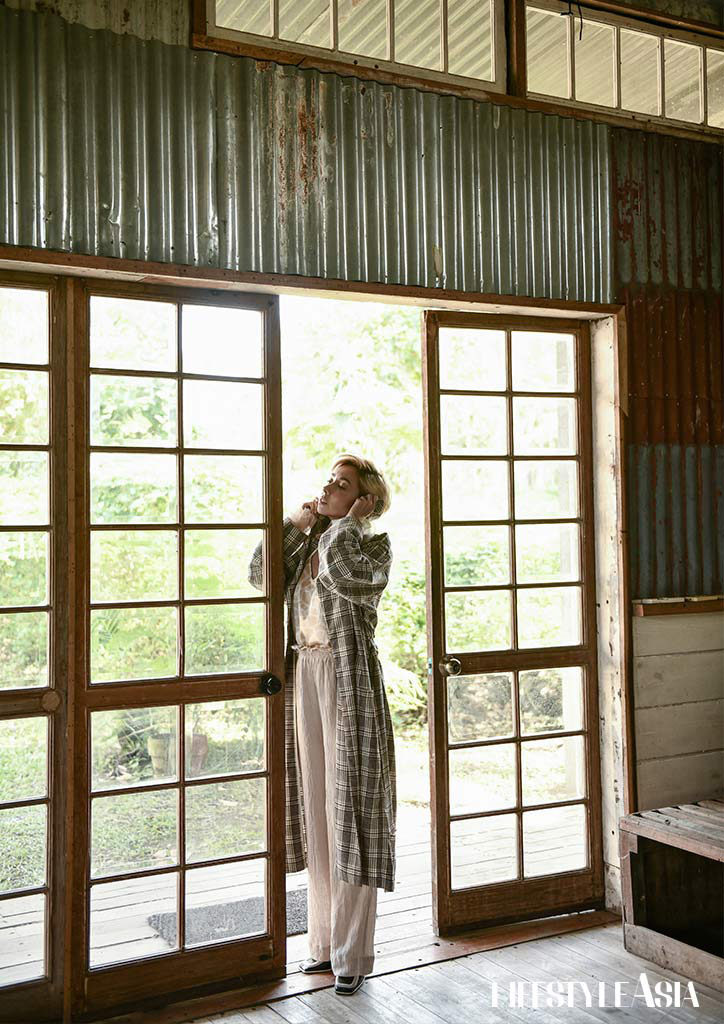
Duster Coat from AERON, Tulle Top from Susanne Bommer, Giraffe Print Silk Tank Top from Federica Tosi, available from House Of Una Ricci
At the Holy Carabao farm, she comes across the gamut of customers. Hindy says that while they cannot force anyone to change habits and instantly be healthy, the best customer is one who comes with a basic understanding or at least a lot of curiosity on what it means to be mindful of the food you eat and the life you live. “That is how we know they really want to learn and change. Unfortunately, most people don’t want to change unless life forces them to – by way of an illness or calamity,” she says.
COVID-19 is a case in point. Hindy mentions that this is not a mere health pandemic. “This is an economic and political pandemic, too. It’s crucial to stay informed through varied avenues of information in order to have a wider perspective,” she says. “I read a lot — a lot lot. And I don’t just read to look for information that already fits my current perspective. I read to learn.” She adds that sometimes this leaves her with knowledge she’d rather not know about. “But if I face it with curiosity and a true desire to understand, then it can be a tool I can use later.”
When the pandemic is over, Hindy hopes this will start a shift in how people live their lives. From food: “I hope we have more edible gardens, ethical businesses, small and home-based business that bring warmth and character to the market,” to behavior: “I hope to see more kind, compassionate, responsible, accountable, ethical people in office,” and in how we treat the earth. “I hope we learn to trust the glorious intelligence of Mother Nature and that it’s not out to get us, but has actually nurtured and supported us through eons of time,” she says. “I hope we see more policies that protect civil rights, our health sovereignty, the protection of animals, our forests, the oceans, our air, the soil. I hope to see the end of institutions that have brought us to this dire state because we now know that we deserve better.”
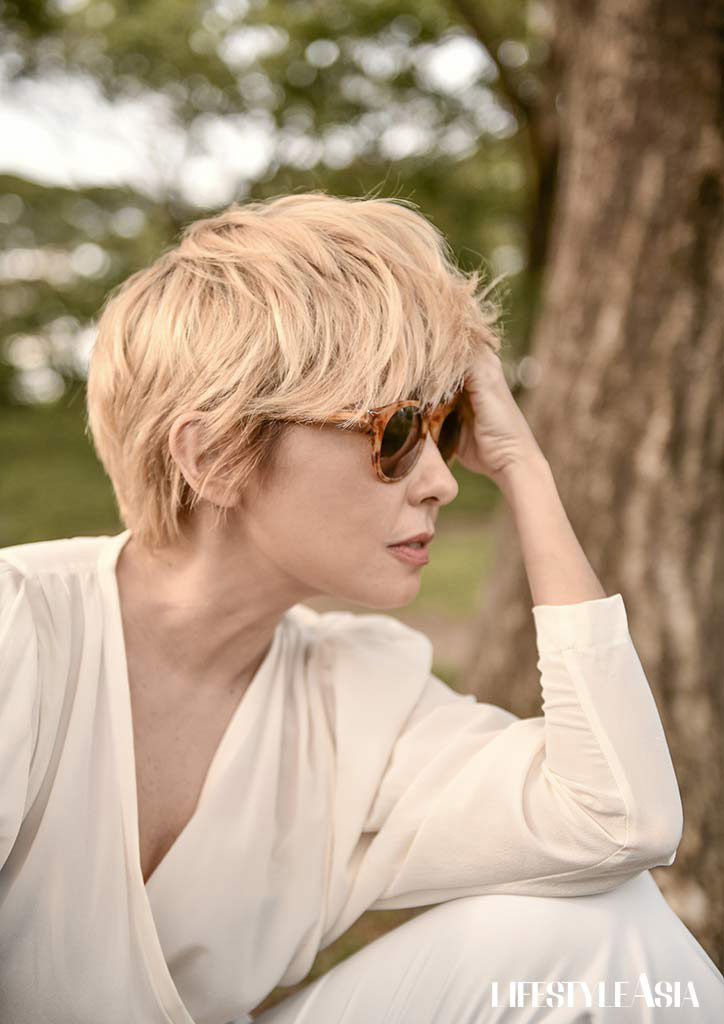
Photos JERRICK SANCHEZ and KIERAN PUNAY of STUDIO 100
Art Direction MARC PAGDILAO
Styling LEANNE LEDESMA OF QURATOR STUDIO
Hair FRANCIS GUINTU
Makeup MAYESA DE LOS SANTOS
Shoot Coordination FAITH LOUISSE LIÑAN
Shot on location THE HOLY CARABAO FARM





